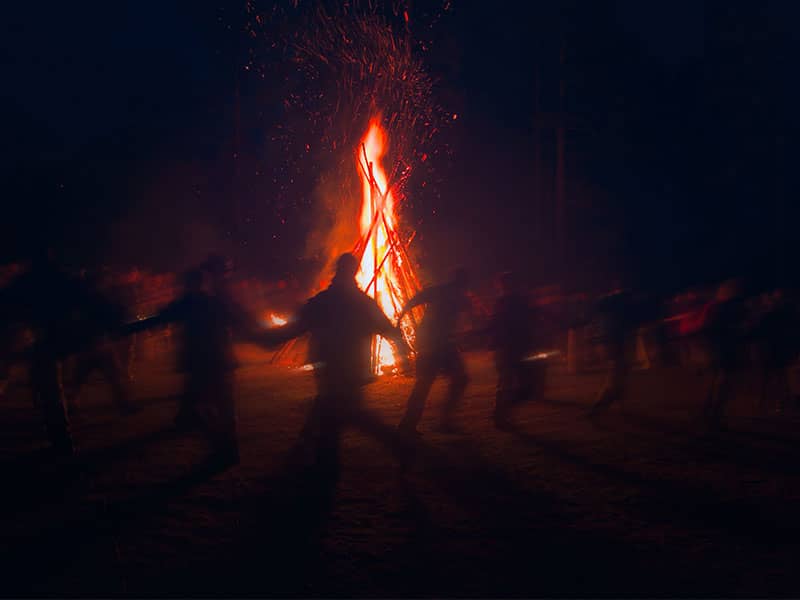The answer depends upon where you are, which hemisphere you happen to be in.
I didn't come to Brazil to teach ritual or work with the Witches. I came to attend the World Social Forum, a massive gathering of groups opposed to globalization, planned as a counterforce to the World Economic Forum taking place in Switzerland at the same time. I also came to work with the groups planning direct action around global economic issues. I was, in fact, quite ignorant of the extent of the Wiccan movement in Brazil. In the land of capoeira, Candomble, and carnival, not to mention a thousand other strange and magical religions, it didn't occur to me that European Paganism would have a huge appeal. Two of my books had been translated into Portuguese, but I'd never received any reports indicating they'd actually sold.
But when word about my trip got out, I received the warmest, kindest e-mail I've ever received from a perfect stranger. A man named Lugh assured me that the Witches of Brazil were willing to put their network at my disposal.
My friend Hilary, her 2-month-old baby, and I arrived at the Sao Paolo airport, tired and sticky after a long flight that had been delayed for four hours and facing a four-hour layover before our next flight. But we were cheered by the sight of four black-clad figures, adorned with rings, bracelets, and pentacles. Lugh, Julia, Anna, and Donovan took our bags, bought us coffee, and entertained us. Lugh, also known as Claudinney, has authored books about Wicca in Portuguese. Julia is a lawyer in recovery, now making jewelry and Pagan craft items. Donovan told us of his trying year as an exchange student living with a fundamentalist family in Kansas, who insisted he attend church and flinched at the sight of his pentacle. So entertaining were they that we barely noticed the time or our fatigue.
Back in Sao Paolo, Lugh and his group had scheduled their Lammas (high summer) celebration so we could attend and had kindly included Brigid so we northerners wouldn't miss entirely her feast of waxing light this year. Their ritual took place in a public square in the center of Sao Paolo, a small fenced park in an area that is a gay and lesbian gathering place on weekends. The ritual involves lots of singing, chanting, and energy raising. If we were to graph the energy flow of a Reclaiming ritual, it would look a bit like the coastal mountains of California, with lots of peaks and valleys, and generally one strong cone of power. The Brazilian ritual was more like climbing up to a high plateau and staying there, with a strong base of energy that never flagged. We shared bread for the Lammas harvest festival, lit candles for Brigid, and ended with a spiral dance and a feast.
One thing that struck me was the openness of the ritual. People passed by the square, some hung on the fence and watched. I saw others watching from windows in the apartment buildings nearby. But I felt no sense of threat--only interested curiosity. In a country where worshipping a whole variety of gods, goddesses, orishas, and spirits is taken for granted, Wicca is just one more Pagan tradition.
The energy of the ritual carried me through a long day of training. But the following night was also the celebration of Iemanja, the orisha, or deity, of the ocean in Candomble, the African-based ecstatic religion of Brazil. Lugh grew up in Candomble and had arranged for us to attend a ceremony. So after the training, I was whisked away for a long, labyrinthine car ride through the outskirts of Sao Paolo to a small Candomble house where the sound of drums echoed into the street.
The room was filled with light and color. The hypnotic drums, the care and attention that was paid to every aspect, from the lace on the dresses to the amazing costumes of the orishas, and the sense of communal warmth and support on an energetic level filled me with a sense of incredible joy and hope.
What does Wicca have to offer a place as rich in magic as Brazil? Why would people there be attracted to a tradition that originates in a totally different climate and culture? I'm not sure, but my sense is that contemporary Wicca's openness and our independence from a coherent body of received liturgy and custom encourage a sense of creativity and freedom that many people crave. As Wicca takes root in each new place, it must change and grow to reflect the culture and the land. The creative Witches of Brazil will undoubtedly enrich our tradition, just as I was enriched by my contact with them.

